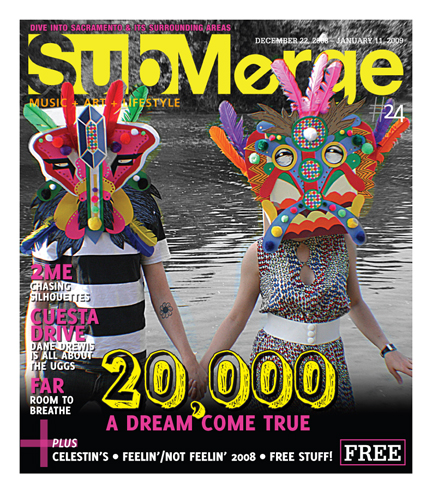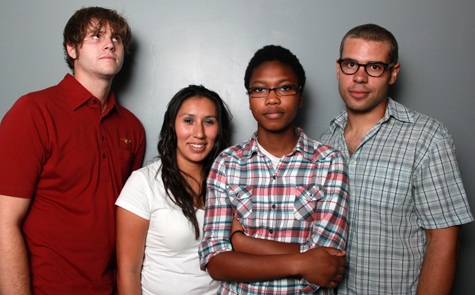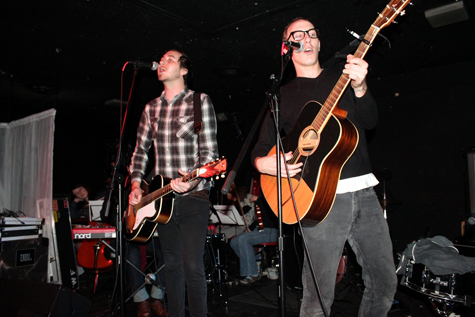Singer/Songwriter Sherman Baker bears his soul, battles addiction and existential dread…all in a day’s work
Words by Joseph Atkins – Photos by Amy Scott
Sherman Baker has lived multiple lives: struggling Los Angeles actor, recovering heroin addict, mild-mannered songwriter. Yet, there’s something about him that eschews both of the former descriptions and settles on the latter. Baker’s bigger than you imagine, listening to his new full-length, Seventeenth Street. His songs make him sound fragile, delicate; but in person his wide shoulders wrap a guitar while he sings upwards into a microphone. On stage he appears focused, intent. His look is exactly right for the sound, and the qualities of Baker’s sound ultimately condition the person he is.
Up close, it’s hard to tell how much of his personality is shaped by the quiet childhood he describes or the humility of a recovering addict, or where they bleed together. But their silent strength produces songs that slowly engulf one’s attention. Baker has enough self-confidence to expose himself, musically or otherwise, to talk honestly about his past and present. He has a soft-spoken manner that leaves a small impression. He’s like a subtle fill that piques one’s interest and becomes the highlight of a track after multiple listens. He’s normal yet unique, exotic in his low-key banality.
There’s a subtlety to his brand of song craft, a fusion of Dylan and Elliott Smith, with the tonal foundations of old school pop. His hooks and harmonies draw out the anguish and joy of repeated failure and angst, verse after verse. Below them, a series of string melodies and rhythms complement and exacerbate his vocal tracks, as the lyric content demands. There’s a focused tension on the struggle of daily life and survival, but I’d suggest this is bigger than just Baker’s struggle with himself. Seventeenth Street is relaxing, serious and thoughtful in its treatment of uncertain conditions–Baker’s and otherwise. We sat down over water and espresso to discuss these uncertainties, the ups and downs of growing.
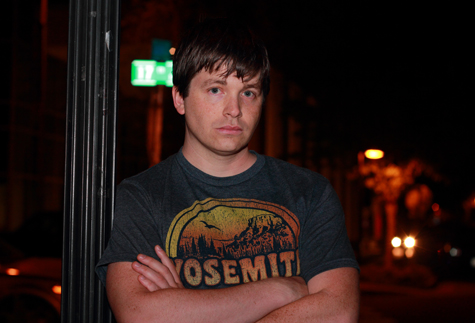
On your opening track, “Constant Contact,” you plead repeatedly for the world to “stop posting things.” Did you check in on Foursquare when we got here?
I did not. I’ve been trying really hard to not be obvious like that. That song came from Facebook [where] an ex-girlfriend used to post about me while we were dating. She’d be like, “Don’t you hate when guys do this.” And then 20 lurker dudes would be like, “Yeah, fuck that guy.”
Do you have other songs about her?
Some of the other songs like, “Golden Gate Park,” “Man on a Wire” and “Sign of Light” are about a [different] ex-girlfriend whom I feel essentially left me for dead and didn’t seem to care that I was overdosing and attempting suicide.
In one of my favorite lines from “Sign of Life” you sing, “There’s no time for philosophy/When you’re fighting/To survive.” The next track follows with another line: “We have tried to be good/But I’d rather be wrong than dead inside.” What is the major antagonist in your life?
The new record is basically about heroin addiction. I was shooting heroin in 2008 to 2009. It wasn’t like, “Oh, Elliott Smith did it, or John Coltrane.” It was a simple addict progression from Vicodin to heroin. A typical Intervention episode was my life. I went to rehab, and after six or seven weeks of horror, I finally came out. The last two years I’ve been moving away from it. I tried to off myself. I was put in a mental hospital. The tension is me trying to fight existential dread.
Yours is actually a success story. Many addicts never even get to rehab. How were you able make the decision to get clean and stay that way?
It’s a daily struggle to stay clean, but I need to in order to survive. There isn’t a way to abuse opiates that doesn’t end in death or severe impairment. My uncle was kind enough to pay for me to go after I asked him for help. It was in L.A. I needed to get out of town. I went a long way from any dealers or money. I was forced to spend a month in one bed crying, shitting and puking on myself. Literally. It was so incredibly painful emotionally; I have felt a little bit numbed ever since. But I’m also certainly a much stronger person. I’m lucky.
I think really great artists tend to be addicted to creating. Do you feel like overcoming one addiction has allowed you to focus your attention more into your musicianship?
One hundred percent. On a physical level, my energy is up; it’s like night and day. I’ve been looking at my music like an athlete–how can I get better every day? Quitting smoking, writing every day, practicing every day, I’m always thinking about what things are helping me. I have a drive to write and make music that is certainly not rational. I’m not making money. Music is my art.
You’re releasing the album yourself. How’d it all come together?
My father died, which opened up money from my family that wasn’t being used for his medical care. I had a really low budget. I recorded a lot of it at my uncle’s house. He’s got a really big place up in Granite Bay. We actually did some of the drums. All the guitars, all the vocals, all the bass–everything I did–was done there.
We mixed at The Hangar and did some of the live drums and bass there. Matt McCord played drums, and Kris Anaya [Doom Bird] played bass on a few songs. Robert “Flossy” Cheek did the mixing.
There’s a definite Elliott Smith influence on the record, but the recording process sounds a lot like his process as well.
Elliott Smith would be a good analogy except I don’t play drums–minus the brilliance factor.
Losing your father seems like a big moment in your narrative. Are there points on the new CD where his loss is felt?Â
Yes, “Lonely Star” is about him to some degree. The bridge lyrics, “Where is the green light?/The future you told me of?” is a reference to The Great Gatsby’s last page about the green light of the dock. It was my father’s favorite book. A lot of the record is about mortality in some way. That might be part of the problem with selling it.Â
What happens if you never sell all the CDs you print?
I’m used to disappointment. If people don’t want to buy my music, I can’t force them to… I’m pretty reconciled to living a low income, humble lifestyle, regardless.
Do you still believe in those divisions between DIY, indie and major labels?
Not really. Death Grips are the latest example of a “big deal,” and they’re as DIY as it gets. I think pipe dreams have definitely disappeared. In the ‘90s, there were a lot of kids thinking, “I just gotta get that deal and then… Chicks!”
You spent some time in L.A. as an actor. How did you get there?
I got into a good acting school. It’s where Denzel Washington went; Elizabeth Banks was there while I was. It actually helped me learn to sing. By the time I left, I just wanted to do music. I went to L.A. because I had an agent; it was a great opportunity. I was trying to get on soap operas. I wanted to focus on music instead.
Then in 2007 my personal life got crazy, and I just dropped out and did drugs for two or three years. I didn’t do much at all. I did in my head, but I wasn’t functioning.
You’ve mentioned that there’s a lot about yourself–your voice, how you look on camera, people watching you–that makes you anxious or nervous. Are we socialized to be confident individuals and overcritical of everyone else?
In a word, yes. I’ve always been kind of shocked at how I’ve put my heart out there and then had it taken apart by a critic or local Internet commentator. I guess it’s my own naiveté. To tear apart local struggling artists and critique a person as if you are writing for the New York Times, reviewing a show at Carnegie Hall, is the height of arrogance. Blogger culture is gross. It’s too easy just to spout off about what you don’t like or do like.
Acting seems like a curious choice seeing as you feel uncomfortable in front of a camera.
I don’t like being looked at. I don’t like being on stage and being looked at, still. I don’t mind being heard because I’m comfortable with how I sound. My stage presence is just as shitty as it ever was; I just stare at the ground and sing. I just couldn’t care less about my stage presence. I’ve just never said, “Oh, I wish I could be like Steven Tyler.” Never. I just don’t care.
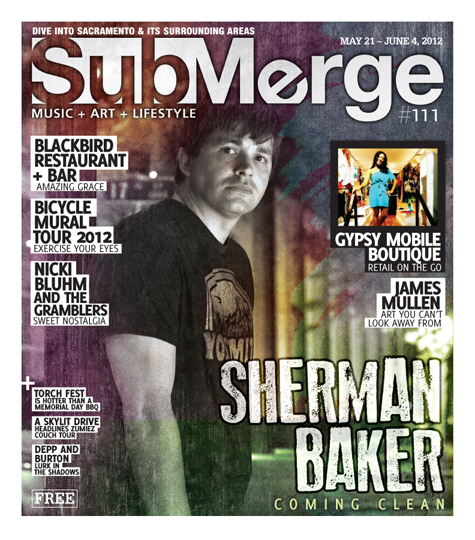
Head to Beatnik Studios in Sacramento on June 2, 2012 to celebrate the release of Sherman Baker’s newest album, Seventeenth Street. Also performing will be Autumn Sky, who also happens to be releasing her new CD that day. If that wasn’t enough for you, Ricky Berger will open. Showtime is 7 p.m. For more info, go to http://shermanbakermusic.com/.

Sac Hates Hip-Hop feat. Mahtie Bush” photo by Don Button, 2007
For local music scene aficionados, Bows and Arrows’ January art show, titled
Eye-Fi: A Retrospective of SN&R Sacramento Music Scene Photography, is one you will not want to miss. At the show’s opening, which is on Jan. 6 from 6 to 10 p.m., there will surely be a whole lot of, “Hey look, that’s so-and-so from such-and-such band,” and definitely a lot of, “I was at that show!” Featured photographers include Wes Davis, Amy Scott, Shoka, Jesse Vasquez, Nick Miller, Carlos Amaya, Don Button, Jon Hermison, Sean Stout, Steven Chea and more. Just some of the local artists captured by said shutterbugs are Ganglians, Appetite, Exquisite Corps, DJ Whores, Mahtie Bush, Kill the Precedent, Sea of Bees, Chase Moore, Dead Western, !!! and many more. At the opening there will be artwork for sale, as well as food, drinks and a live DJ. Bows and Arrows is located at 1815 19th Street. If you can’t make it to the reception, make sure you stop in before Feb. 2, 2012 to see the photos.
-J. Carabba
Der Spazm’s new EP is the culmination of a year’s worth of work
Never expect a band to be punctual.
“Hopefully everyone’s on time,” says Leticia Garcia, lead guitarist of experimental, indie rock quartet Der Spazm, the song “Electric Feel” by MGMT humming at a low volume within the confines of her gold Honda Accord. Bassist and backing vocalist Ashley Maiden rides shotgun; the two band mates chat about the latest Exquisite Corps show and the daily grind of their jobs. This casual, end-of-day gab kills time on the trek from Midtown to Sacramento Rehearsal Studios, where the band practices for their upcoming show at Old Ironsides celebrating the release of their six-song EP, 1000 Days.
Although Der Spazm have only solidified their lineup since May of last year, the band has performed on the steps of the Capitol in support of Sacramento Pride Week, admits they felt comfortable recording their EP in a former insane asylum in Stockton and have several colorful stories to share, like a Bay Area road trip gone terrible–involving barf, bands and a backseat passenger who unfortunately fell victim to said barf. From surviving car accidents together to supporting one another in the heat of Proposition 8, Der Spazm have grown into a tight-knit group of friends who just so happen to play in a band together.
Pulling up to the barbed wire-guarded practice space, Garcia presses a plastic cardkey to a black machine near the entrance, instantly cuing the gate to roll open and granting the two access.
“Never buy the box of 100 band aids at Grocery Outlet. That’s why I’m putting on three band aids right now,” says Maiden, sealing her injured finger.
Once inside, Der Spazm’s weekly routine begins. Drummer Andy Fisher sits behind his kit, idly jamming on his snare drum and high hat cymbals, completely encased behind the beats he creates. Maiden fidgets with her wounded finger and cheap band aids once more before plugging in her bass, and Garcia swings her Gretsch electronic guitar over her shoulder, the instrument appearing heavy on her petite frame.
Arranged orange and black chords, organized tools and guitar equipment hang to the right on one wall, while a U2 “The Best of 1980-1990” poster is tacked on another near the door of room No. 130. A stuffed tiger rests proudly above a PA speaker, its tail dangling down the side. The deep, sloth-like chug-chug of metal-inspired guitar chords erupts from various rooms lining the hallways of Sacramento Rehearsal Studios, whose bathroom still reeks of piss and 99 Cents store toilet cleaner. Back inside their practice space, a makeshift recording filter crafted from a simple wire hanger and an old pair of chocolate-colored panty hose lays abandoned atop a guitar amp.
“Sorry I’m late,” says Dillon Christensen (guitar, vocals), entering the room with the grace of Seinfeld’s Kramer. He sets down a massive, pastel-colored plaid board lined with every effects pedal imaginable: distortion, equalizer, digital delay, blues overdrive, memory toy, digital reverb and a handful of others. Each rectangular-shaped pedal is assigned to a certain spot upon his wooden platform, each holding the ability to immediately transform the sound of Christensen’s guitar with just the mere tap of a foot.
With every member now present, an impromptu jam session quickly begins. Garcia’s long brown locks sway to the momentum her body creates as her hand twitches up and down the fret board, fingers squeezing out euphonious melodies followed by Fisher, crashing in on drums, keeping up the momentum Garcia just developed. Stomping on his distortion pedal, Christensen adds a third layer to the mix, slightly changing the speed and volume of the song as Maiden, with eyes closed, seals the experimental rock base Der Spazm emanates with groovy bass lines and a James Brown swagger as her feet take on a path of their own dancing to the low, supporting sounds of her Fender Jaguar bass guitar.
“I could have had a shitty week and work is fucked, and I don’t want to be home and you feel like the world’s going to end, but then we get together; something about us playing, almost makes it feel like we’re not here, like we’re somewhere else,” says Christensen of the band’s chemistry.
Der Spazm started recording their 1000 Days EP in late November 2010 and now the release show is only weeks away. However, the location in which the band chose to record their EP was a bit strange in itself. On the weekends, the band would drive down to record at an old insane asylum in Stockton, later changing its tune as the Alan Short Center, according to Christensen, an institution for adults with developmental disabilities using the arts, like music, to heal.
“The environment really helped us to focus in and bang shit out,” says Christensen.
“Comfortable in an insane asylum, you know,” Maiden jokingly adds.
But what’s more insane is the wide array of incidents this band has endured in each other’s company. In January of last year, Christensen and Garcia survived a car accident on I and 18th streets. And though they are not to blame, Christensen does admit he was listening to Sonic Youth at the time and he thought I Street was not in fact, a one way street. Fortunately, both survived the accident, but the car ride adventures don’t stop there for members of Der Spazm.
“I went to see the Dodos with the Alcohol Plague in San Francisco. I was the designated driver. They got wasted and we were doing OK on the way home, but we get on the bridge and all of a sudden one of them barfs out the window and I’m laughing, and the guy in the backseat starts yelling, ‘It’s in my mouth,’” says Garcia, laughing at the memory.
Still, in times of misfortune, or in times of strange entertainment involving a little roadside spew, Der Spazm used it all to write track one on the 1000 Days EP called, “Happy Accidents.”
“It’s just about being content with how things are and realizing that things will happen, happy accidents will happen,” says Christensen.
But, while some songs are written from a place of laughter, others take a more political stance, like in their song “Sentinel,” written by Maiden in the heat of Proposition 8.
“I wrote ‘Sentinel’ about all the Prop. 8 stuff that was happening,” says Maiden. “Then, Prop. 8 passed and there were rallies all over the Capitol and California. The queer community just came together and it was amazing. And I was like, ‘Love is born in the heart of revolution.’ I think that was the best drunk line I ever came up with. It can apply to anything.”
Der Spazm may be the most diverse group of musicians when it comes to race, gender and even sexual orientation in Sacramento, consisting of two men and two women musicians, one of which happens to be a lead guitarist. Some work for the state, some are full-time students at Sacramento State, one works construction, while the other is watching the quality of our water and environment. But, regardless of who’s who, the members of Der Spazm collectively agree they just click and their year-long struggle to release a finished package of music has finally come to a close.
“We’re finally getting something out that we’re proud of. This is us. This is just a snapshot of our sound; it’s just who we are,” says Christensen.
Der Spazm will celebrate the release of their 1000 Days EP with Babs Johnson Gang and Mr. Loveless at Old Ironsides on Saturday, Sept. 24. The show starts at 9 p.m. and will cost just $5. 21-and-over only.
Roman Funerals, X-Ray Press, Winter’s Fall
Sunday, Jan. 30, 2011 – Townhouse – Sacramento
Let’s face it: watching two or more hours of the same genre of music rarely keeps the full attention of any audience, whether it’s thrashy punk rock or a dose of lulling acoustic folk. The jumble of bands playing Sunday’s show at the Townhouse, headlined by Sacramento’s Roman Funerals, provided a different kind of experience instead.

Winter's Fall
I was in the ladies’ room when I heard the drums of the opening band overhead, one hour past show time. I ran upstairs in time to see the five members of the Berkeley, Calif., band Winter’s Fall onstage playing “Anyways” from their newly released album At All Angles. Thirty-five or so people were fanned across the bar and corners of the room. Wearing button-down shirts and sneakers to fit the part, it was the first time the self-described Americana, indie folk rock band had played a show in Sacramento. I was immediately caught off-guard by lead vocalist Peter Stanley’s voice, which varies between a distinctly higher, somewhat nasaly quality like Jon Thor Birgisson in Sigur Ros and a lower range like the voice of The National’s Matt Berninger. The songs lasted four to five minutes, transitioning from upbeat guitar hooks to dreamy layers of guitars mixed with synthesizers and harmonized vocals, creating a full, soothing sound that was both folk and rock. Topped off with the sweet sound of a lap steel guitar and Stanley’s voice, their songs radiated country undertones. They played “Who’s to Say,” also off of At All Angles, and “Paper Chains” from their 2008 release Winter’s Fall.

X-Ray Press
X-Ray Press from Seattle eradicated every ounce of calm left in the room. The five-piece band pounded out a foreign genre that overlaps math rock, hardcore and punk creating a sort of ‘90s-meets-the-future sound. Despite their contagious, frenetic energy complete with head-banging and string tapping, the audience refrained from wriggling and writhing in front of the stage–maybe because they were in shock. Imagine beeping robot sounds composed to distorted guitars and intricate drumming, stopping abruptly to change the tempo two to three times within the same song, and you will have a vague conception of what this band sounded like. Lead vocalists Michael Pasuit and Paurl Walsh exchanged screaming and melodies over the various time signatures, sounding something like Brandon Boyd from Incubus singing over Dennis Lyxzén of Refused.
Roman Funerals headlined the show, fronted by brothers Evan and Matt Ferro of the former Sacramento band Bright Light Fever. Several local performers joined them on stage, including Kris Anaya of Doom Bird and the Alternative String Band. The set began with “Change in Weather,” a haunting opener filled with heavy drums and melancholy guitar riffs. Their songs are lyrically rich and eerie, with the brothers delivering most of the words in harmony with a sort of raw intensity, joined by their acoustic guitars. “I go to sleep at night wearing all my clothes in case the rich kids come to get me. They’ll take me away to a house on the hill and tell me lies about American history,” were the opening lines of “Secrets for Sale,” followed with booming drums, tambourine shakes and echoing “ooh ahhhs” that the audience sang along to. The harmonies joined with the percussion sounded something like Fleet Foxes but with the darkness of a Neko Case song. The accompanying keys, played by Anaya, added just the right touch of mood-setting. They played all the songs from their EP Six of Us, in addition to a cover of the Doom Bird song “Shape of Hearts,” at which point Sacramento’s Alternative String Band joined in with cellos and violins. Only the brothers and the String Band remained on stage to play their final song, “Six of Us,” a melancholy song that they noted “is about our father’s daughter’s children.” The brothers thanked the crowd for sticking around past midnight on a Sunday night at the end of set, and, with an act of generosity, left a stack of 10 free CDs on the stage for the audience to take.
Exquisite Corps, Der Spazm
Thursday, June 3, 2010 – Old Ironsides – Sacramento
Words by Joseph Atkins – Photos by Amy Scott
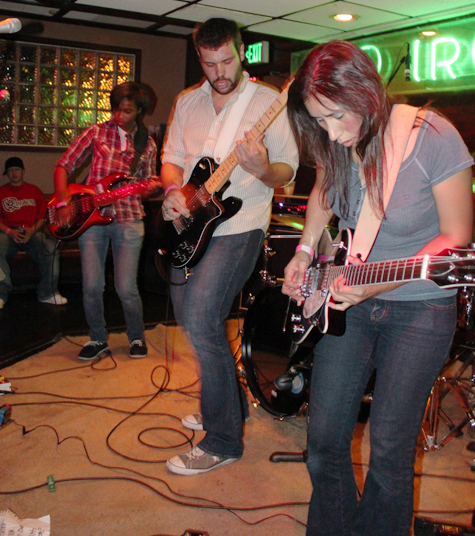
Der Spazm
In Der Spazm, Ashley provides bass and vocals, and Leticia provides the majority of the lead fretwork and floating octave accompaniment. Their songs are a patchwork of arpeggiated licks that float across the rhythm guitar and lyric lines of a young and lightly bearded frontman, Dillon. Bouncy and jittery, their tunes enable easy allusion to multiple post-punk groups. But rather than leave Der Spazm floundering at the feet of their mentors, we want to place them in our own time. The lyrics of one chorus in particular say, “Love is born in the heart of a/Revolution,” calling attention to our constant, varied antagonisms. The shout-climax of the word “revolution” is emphasized by both Dillon and Ashley (who wrote the lyrics).
The song was composed in response to the events preceding Prop 8, which officially legalized inequality, and we should note what has occurred since 2008. On a cultural basis we’re witnessing the erosion of personal liberties. A partial list goes something like this: Prop 8, California student protests and arrests, Arizona Immigration Act, BP oil spill censorship, culminating with the Israeli raid of a flotilla protest last week when a teenage U.S. citizen was shot through the head. Individually these events corrupt the universal ideas of say, “Life, liberty, and the pursuit of happiness,” and Der Spazm places love as an opposing force. Love is the thing growing, inside of the heart outwards, into the greater body at large, circulating through the body politic (“man,” that political animal), which realizes itself as revolution. Revolution isn’t necessarily the purpose; it’s a unified response to a militarized state opposition. While we’re not here to put politics into the jittery joyous melodies of Der Spazm, we are here to place Der Spazm’s spastic tensions within the politics of the world at large–the place where we all indefinitely exist. A place and time where Der Spazm is both pleasure and opposition in a direct, interconnected act.
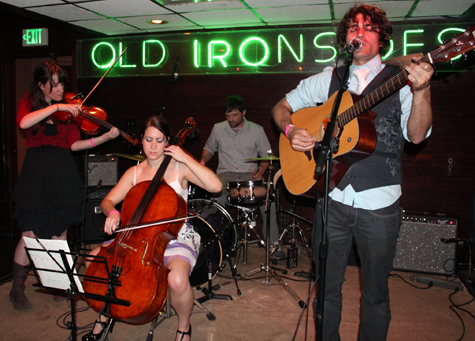
Exquisite Corps
To contrast the sounds of Der Spazm, Exquisite Corps placated the audience with the lulling movement of bows over a violin and cello combination. Krystyna Ogella primarily lays out the bass lines on cello, while Holly Harrison supplements vocal harmonies and provides lead melodies throughout the songs. Patrick Boylan keeps time on drums, rumbling the songs forward with a series of bass drum-floor tom rhythms, while Bryan Valenzuela provides the vocals and acoustic chord structures filling out the canvas of sound. The vocal melodies come out from the deep cavern of Valenzuela’s mouth, an arid timbre ricocheting out of his subtly parted lips, before rising into the higher registers. The songs are dominated by a sort of narrative lyric flow, a series of events set in chronological order accumulating tension until the choral release. Valenzuela’s shaggy curly hair throws shadows over his closed eyes as he grimaces and sneers his soft discomfort into the mic. The group achieves something slightly lighter than Murder By Death, though they share that sort of folk macabre on occasion. As a name for a young band playing its third show and already headlining, they make an interesting statement.
The surrealists developed the exquisite corpse exercise where each member draws something then covers it up so another can add to it without any conscious connection. Musically the group doesn’t recreate that spontaneity, instead the pun on the corpse as body into the sort of militarized corps, or group, as Valenzuela says, “Like the Marine Corps.” Forcing us backward through the garbage pile of history, the inter-war period of Europe, and landing in our time harmoniously disjunctive at that great venue Old Ironsides, established just after the surrealists themselves, 1934.
20,000 Breaks into the Sacramento Music Scene
Comprised of locals David Mohr and girlfriend Meg Larkin, the band 20,000 is relatively new to the Sacramento music scene—but with their youthful energy and down to earth attitudes, it’s no wonder that fans are quickly tuning in. “By default, I usually just say it’s dance music with guy/girl vocals and synthesizers,” Larkin says about their style. Even if you’re not typically a fan of dance music, there is no doubt that the upbeat tempo and catchy lyrics of 20,000 will have you up and out of your seat in no time.
It started as a dream—literally. Mohr says, “I had a dream a while ago that we had a band and we named it 20,000.” Both Mohr and Larkin are adamant that if you dream it, you must do it, and thus 20,000 was born. “If you do what you do in your dreams in real life, then it’s almost like you’re predicting the future,” Mohr says.
“Yeah, it’s true,” Larkin adds. “If you dream that you’re wearing red socks, you have to buy a pair of red socks and wear them.”
About two years ago, sparks started flying, musically, that is. Mohr began writing music on his computer, and then he and Larkin started adding vocals. Mohr says, “When I was writing the songs for the album, I was listening to music that has a lot of synths in it, but not necessarily electronic music.” They cite musicians such as Prince, Talking Heads and Hot Chip as being very influential during that time period. Larkin says, “Up until a couple of years ago I never really listened to dance music, but it’s some of my favorite music now.”
The goal for their music is simple: create songs with a good beat that people will want to party and dance to. Mohr says, “While we were recording the album, I was thinking it would be cool to just have a good CD for people to listen to in their houses at parties.” He writes all of their songs, and is no stranger to the music world. He played with some of his high school buddies in a band called Didley Squat for about six years, and when that gig dissolved, he naturally transitioned into forming 20,000.
While they had been diligently practicing and recording songs at home for many months, their first live performance happened this past August, at Old Ironsides. “We were apparently really visibly nervous,” Larkin remembers. “I was wearing short shorts and this crop top, just trying to be funny, but it was the most intimidating outfit to wear in front of people as a joke.” While their first show was definitely nerve-wracking, a lot of their friends came out to show support and it was a fun experience that paved the way for future shows. Other than Old Ironsides, they’ve played at Javalounge, Luigi’s Fun Garden and Blue Lamp.
When transitioning to live performances, Mohr says that one of the biggest challenges is figuring out how to make everything sound right in such a drastically different environment. After spending two years perfecting their songs in their apartment with only a tiny set of computer speakers—and trying to keep the noise level down so as not to disturb the neighbors—they now had to create a seamless performance in a real venue.
For Larkin, there was the added challenge of being brand-new to the music scene. She had been involved with musicals during high school but had no prior experience with playing an instrument. “When we decided to start playing live shows, I learned how to play rudimentary keyboard,” she says. This was completely terrifying at first, and she remembers being nervous for six or seven hours before a show, to the point where she could barely eat or drink. But as time went on and performing became more commonplace, her nervous energy eventually went away, and now she loves the thrill of shows. “When we have a show and there’s people responding to it and everyone is nice it’s like, yes! We’re the best band ever! Let’s do this every night!”
Both members play keyboards and sing, and their drumbeats are on an iPod. This means that they can carry all of their instruments to a show and set everything up on their own—no roadies required. “It’s super easy for us to set up,” Larkin explains, adding that it literally takes about four minutes. “Just put the keyboards on the stand, plug it in, turn the iPod on and we’re set.”
Although perhaps they hadn’t planned to “make it big” in the music business, the Sacramento music scene has been good to 20,000. Larkin is surprised at how easy it has been to get shows that they really enjoy. Their friends have also been extremely encouraging in this new venture. Larkin says, “It’s definitely been cool to see how supportive our friends have been, getting them to come out and pay for shows over and over and over again.”
20,000 will likely become a common name in the Sacramento area as time progresses. The couple is ecstatic about their 2009 New Year’s Eve show at Blue Lamp, which has been the biggest show they’ve played so far.
You can check them out on Myspace: www.myspace.com/20000music.
